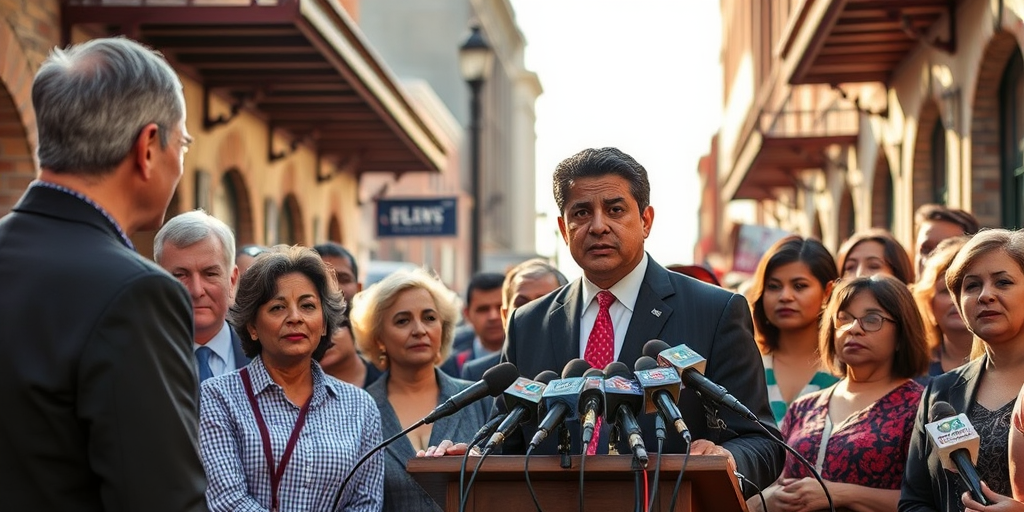Mayor Villalobos Urges Balanced Immigration Reform: A Call for Economic Growth and Stability
In a move signaling strategic economic foresight, McAllen Mayor Javier Villalobos has lauded the federal government’s recent success in border security while charting a course for further immigration reform focused on enhancing the Rio Grande Valley’s (RGV) economic landscape. Speaking from a position shaped by McAllen’s unique geographical and cultural ties, Mayor Villalobos’ message stressed the significance of integrating lawful employment opportunities separately from the wider discourse on citizenship.
Contextualizing the Call for Reform
The Rio Grande Valley, a border region in South Texas, has long been at the intersection of immigration debates due to its proximity to Mexico. Known for its vibrant culture and dynamic economic exchanges, the area has faced challenges balancing security measures with maintaining the flow of commerce and culture. Texas Border Business, a publication dedicated to promoting commerce across the Valley, reports on the myriad efforts by federal and local entities to address these complex issues.
Recent statistics indicate a striking decline in illegal border crossings, reaching a decade-low, thanks partly to enhanced national security efforts. This milestone provides local leaders like Villalobos the impetus to refocus on pressing economic priorities. “As Mayor of the City of McAllen, I express my gratitude to federal officials for their diligent efforts,” Villalobos stated in a recent video address. “Now is the time to strategically leverage this security to bolster our community’s economic prospects.”
The Economic Imperative: Employment Authorization
Central to Villalobos’ proposal is the economic integration of immigrants through lawful employment opportunities. By decoupling employment authorization from the broader citizenship conversation, he advocates a practical approach to fostering immediate economic benefits. “We must provide pathways to employment now and navigate citizenship discussions separately,” Villalobos insisted. Such measures, he argued, are vital to meeting the demand for human capital—especially important for large-scale industrial expansions in the Valley.
For Valley residents, this call underscores an urgency to harness regional potential through clear-cut policy shifts. Local economist Dr. Teresa Galvan supports this sentiment: “Access to lawful employment for immigrants can greatly contribute to the Valley’s economic engine, ensuring our industries have the manpower to thrive.”
Local Impact and Regional Relations
The RGV, known for its binational interactions, stands to gain significantly from Villalobos’ approach. McAllen’s role as an economic and cultural nexus between the United States and Latin America is crucial in understanding the broader implications of such immigration reform. With tourism, trade, and cultural exchange constituting significant aspects of local sustenance, policies encouraging smoother cross-border employment align with local interests.
Luis Garza, President of the RGV Chamber of Commerce, highlighted the potential ripple effects: “McAllen’s prosperity is inextricably linked to our ability to cultivate and sustain strong binational relationships. Ensuring labor markets remain accessible supports this vision, encouraging growth and innovation across sectors.”
Challenges and Community Perspectives
While the proposal garners support, it isn’t without concerns. Some community voices caution against potential disruptions in public services funding without balanced fiscal policies. Additionally, the challenge lies in reconciling national security imperatives with community needs for growth and inclusion.
From the perspective of local businesses, pragmatic reform offers hope. Rosa Cantu, a local business owner, remarked, “Our workforce is diverse and talented. Allowing them formal employment rights immediately strengthens not only businesses but our entire community fabric.”
Historical Context and Future Outlook
The RGV’s situation today is rooted in decades of evolving immigration dynamics. Historically, the region has seen cycles of tightening regulations followed by community-driven advocacy for economic and social integration. Villalobos’ call blends this historical perspective with modern economic strategies, signaling potential for a fortified future that balances security with progress.
Moving forward, Mayor Villalobos aims to involve the RGV’s community in discussions about shaping policy direction. As debates continue, stakeholders emphasize the need for a coherent strategy promoting economic stability, cultural vibrancy, and community resilience.
Residents looking to engage with these developments can follow Texas Border Business for regular updates and insights into the ongoing legislative discourse. With anticipated public forums and session meetings, Valley locals are encouraged to contribute to a path that ensures long-term gains for all.
Ultimately, Mayor Villalobos’ vision for balanced immigration reform postures the RGV as a leader in innovation and inclusive growth, marking a pivotal chapter in the region’s ongoing narrative of perseverance and prosperity.







